| Listing 1 - 10 of 25 | << page >> |
Sort by
|
Multi

ISSN: 09866019 27818497 ISBN: 9782867814518 2867814510 9791030004168 Year: 2018 Volume: 25 Publisher: Pessac : Presses Universitaires de Bordeaux,
Abstract | Keywords | Export | Availability | Bookmark
 Loading...
Loading...Choose an application
- Reference Manager
- EndNote
- RefWorks (Direct export to RefWorks)
Penser la question de la valeur en art, la question des valeurs de l'art, à un moment où la promotion semble massivement prendre la place de la critique, cela revient à articuler après d'autres (et profitant de leurs acquis, du recul sur leurs réflexions) art et éthique. La traversée de ce questionnement se fera en trois temps. D'abord en revenant sur les instruments de mesure que l'on doit mobiliser pour interroger à nouveaux frais une économie de la valeur esthétique. Puis, en analysant certaines mises en œuvres exemplaires de la Modernité, des petits Romantiques aux Situationnistes. Car il y a bien une spécificité moderne de ce questionnement, qui n'est pas seulement théorique puisqu'il conditionne le contenu même des œuvres de Mallarmé, Proust ou Péguy. C'est cette fabrique des valeurs qu'il faut enfin décrire et analyser : en élargissant le champ du côté de la paralittérature, de la valorisation récente de la littérature de jeunesse, des enjeux de la traduction ; en examinant comment Jules Verne a été ou non reçu comme texte véritablement « littéraire » ; en laissant à King Kong, ce monstre ambivalent du cinéma parlant, non pas le mot de la fin mais le pouvoir de reconduire l'envoûtement des œuvres qui nous ravissent. Pouvoir sans lequel il n'y aurait simplement aucun sens à reposer la question de la valeur, c'est-à-dire de la force, de l'art.
French literature --- Art --- General ethics --- Literature --- 82.01 --- 82.01 Esthetica --- Esthetica --- Literary Theory & Criticism --- esthétique --- philosophie --- littérature --- valeur
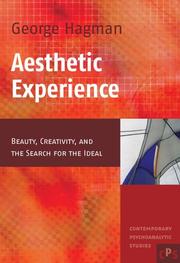
ISBN: 128300934X 9786613009340 9042033002 1423791436 9781423791430 9789042033009 9781283009348 9042018569 9789042018563 6613009342 Year: 2005 Publisher: Leiden; Boston : BRILL,
Abstract | Keywords | Export | Availability | Bookmark
 Loading...
Loading...Choose an application
- Reference Manager
- EndNote
- RefWorks (Direct export to RefWorks)
"George Hagman looks anew at psychoanalytic ideas about art and beauty through the lens of current developmental psychology that recognizes the importance of attachment and affiliative motivational systems. In dialogue with theorists such as Freud, Ehrenzweig, Kris, Rank, Winnicott, Kohut, and many others, Hagman brings the psychoanalytic understanding of aesthetic experience into the 21st century. He amends and extends old concepts and offers a wealth of stimulating new ideas regarding the creative process, the ideal, beauty, ugliness, and -perhaps his most original contribution-the sublime.
Aesthetics. --- Psychoanalysis. --- Psychology --- Psychology, Pathological --- Beautiful, The --- Beauty --- Esthetics --- Taste (Aesthetics) --- Philosophy --- Art --- Criticism --- Literature --- Proportion --- Symmetry --- 82.01 --- 82.01 Esthetica --- Esthetica --- Aesthetics --- Radio broadcasting Aesthetics
Book
Abstract | Keywords | Export | Availability | Bookmark
 Loading...
Loading...Choose an application
- Reference Manager
- EndNote
- RefWorks (Direct export to RefWorks)
Literaire kritiek ; taalfilosofie ; R. Barthes --- 82.01 --- Roland Barthes --- cultuurfilosofie --- schrijven --- teksten --- Barthes Roland --- twintigste eeuw --- 130.2 --- Literatuur ; essays over literatuur --- 1.07 --- Filosofie ; filosofen (A - Z)
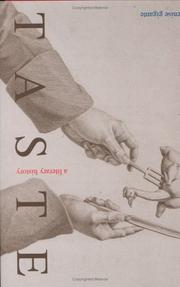
ISBN: 0300106521 9786611731250 1281731250 0300133057 9780300133059 9780300106527 9781281731258 6611731253 Year: 2005 Publisher: New Haven : Yale University Press,
Abstract | Keywords | Export | Availability | Bookmark
 Loading...
Loading...Choose an application
- Reference Manager
- EndNote
- RefWorks (Direct export to RefWorks)
What does eating have to do with aesthetic taste? While most accounts of aesthetic history avoid the gustatory aspects of taste, this book rewrites standard history to uncover the constitutive and dramatic tension between appetite and aesthetics at the heart of British literary tradition. From Milton through the Romantics, the metaphor of taste serves to mediate aesthetic judgment and consumerism, gusto and snobbery, gastronomes and gluttons, vampires and vegetarians, as well as the philosophy and physiology of food. The author advances a theory of taste based on Milton's model of the human as consumer (and digester) of food, words, and other commodities-a consumer whose tasteful, subliminal self remains haunted by its own corporeality. Radically rereading Wordsworth's feeding mind, Lamb's gastronomical essays, Byron's cannibals and other deviant diners, and Kantian nausea, Taste resituates Romanticism as a period that naturally saw the rise of the restaurant and the pleasures of the table as a cultural field for the practice of aesthetics.
Aesthetics, British. --- English literature --- Food habits in literature. --- Food in literature. --- Gastronomy in literature. --- Taste in literature. --- History and criticism. --- 82.01 --- 82.091 --- 82.091 Vergelijkende literatuurstudie --- Vergelijkende literatuurstudie --- 82.01 Esthetica --- Esthetica --- Aesthetics, British --- Food habits in literature --- Food in literature --- Gastronomy in literature --- Taste in literature --- Aesthetics, English --- British aesthetics --- English aesthetics --- History and criticism
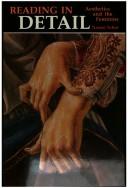
ISBN: 0416015115 0416015212 Year: 1987 Publisher: New York (N.Y.) Methuen
Abstract | Keywords | Export | Availability | Bookmark
 Loading...
Loading...Choose an application
- Reference Manager
- EndNote
- RefWorks (Direct export to RefWorks)
Aesthetics --- Femininity (Philosophy) --- 7.01 --- CDL --- 82.01 --- Beautiful, The --- Beauty --- Esthetics --- Taste (Aesthetics) --- Philosophy --- Art --- Criticism --- Literature --- Proportion --- Symmetry --- 82.01 Esthetica --- Esthetica --- Philosophical anthropology --- Psychology --- Sociology of the family. Sociology of sexuality --- Fiction --- Sociology of literature --- Radio broadcasting Aesthetics
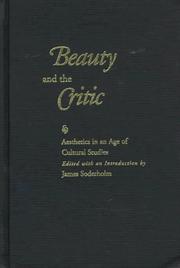
ISBN: 058526144X 9780585261447 0817308717 9780817308711 0817308911 9780817308919 Year: 1997 Publisher: Tuscaloosa University of Alabama Press
Abstract | Keywords | Export | Availability | Bookmark
 Loading...
Loading...Choose an application
- Reference Manager
- EndNote
- RefWorks (Direct export to RefWorks)
Aesthetics. --- Aestheticism (Literature) --- Aesthetics --- Philosophy --- Philosophy & Religion --- Beautiful, The --- Beauty --- Esthetics --- Taste (Aesthetics) --- Art --- Criticism --- Literature --- Proportion --- Symmetry --- Decadence (Literary movement) --- Literary movements --- Literature, Modern --- Psychology --- History and criticism --- 82.01 --- 82:3 --- 82:3 Literatuur en maatschappijwetenschappen --- Literatuur en maatschappijwetenschappen --- 82.01 Esthetica --- Esthetica --- Aestheticism (Literature). --- Radio broadcasting Aesthetics
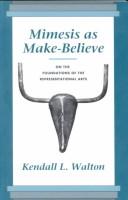
ISBN: 0674576195 0674576039 9780674576032 Year: 1990 Publisher: Cambridge London : Harvard University Press,
Abstract | Keywords | Export | Availability | Bookmark
 Loading...
Loading...Choose an application
- Reference Manager
- EndNote
- RefWorks (Direct export to RefWorks)
Aesthetics --- Aesthetics. --- Representation (Philosophy) --- Mimesis in literature. --- Esthétique --- Représentation (Philosophie) --- Mimésis dans la littérature --- mimesis --- kunsttheorie --- esthetica --- voorstelling --- representatie --- fictie --- figuratie --- 7.01 --- 82.01 --- Mimesis in literature --- Representationalism (Philosophy) --- Representationism (Philosophy) --- Culture --- Philosophy --- Representation (Literature) --- Imitation in literature --- Realism in literature --- Beautiful, The --- Beauty --- Esthetics --- Taste (Aesthetics) --- Art --- Criticism --- Literature --- Proportion --- Symmetry --- Esthetica --- Psychology --- 82.01 Esthetica --- Representation (Philosophy). --- Esthétique --- Représentation (Philosophie) --- Mimésis dans la littérature --- philosophy of art --- Radio broadcasting Aesthetics
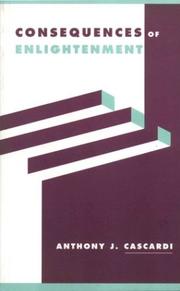
ISBN: 0521484901 052148149X 1107112648 0511116217 0511004869 051114928X 0511302959 0511483104 1280151897 0511053134 9780521484909 9780511004865 0511037899 9780511037894 9780511116216 9780521481496 9780511483103 9781107112643 9781280151897 9780511302954 9780511053139 Year: 1999 Volume: 30 Publisher: Cambridge : Cambridge University Press,
Abstract | Keywords | Export | Availability | Bookmark
 Loading...
Loading...Choose an application
- Reference Manager
- EndNote
- RefWorks (Direct export to RefWorks)
What is the relationship between contemporary intellectual culture and the European Enlightenment it claims to reject? In Consequences of Enlightenment, Anthony Cascardi revisits the arguments advanced in Horkheimer and Adorno's seminal work Dialectic of Enlightenment. Cascardi argues against the view that postmodern culture has rejected Enlightenment beliefs and explores instead the continuities contemporary theory shares with Kant's failed ambition to bring the project of Enlightenment to completion. He explores the link between aesthetics and politics in thinkers as diverse as Habermas, Derrida, Arendt, Nietzsche, Hegel, and Wittgenstein in order to reverse the tendency to see works of art simply in terms of the worldly practices among which they are situated.
Aesthetics --- Aesthetics, Modern --- Enlightenment. --- Political aspects. --- History of philosophy --- Philosophy and psychology of culture --- anno 1900-1999 --- anno 1700-1799 --- Enlightenment --- Esthétique --- Esthétique moderne --- Siècle des lumières --- Political aspects --- Aspect politique --- Horkheimer, Max, --- Adorno, Theodor W., --- 82.01 --- 111.85 --- 111.85 Metafysica: schoonheid; metafysische esthetica --- Metafysica: schoonheid; metafysische esthetica --- 82.01 Esthetica --- Esthetica --- Aufklärung --- Eighteenth century --- Philosophy, Modern --- Rationalism --- History --- Arts and Humanities --- Literature --- Radio broadcasting Aesthetics --- Aesthetics - Political aspects. --- Aesthetics, Modern - 20th century.
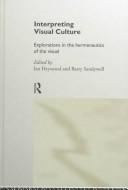
ISBN: 1134729235 1280139811 0203984595 9780203984598 0415157099 9780415157094 9780415157100 0415157102 9786610139811 6610139814 0415157102 9781134729234 9781280139819 9781134729180 9781134729227 1134729227 Year: 1999 Publisher: London : Routledge,
Abstract | Keywords | Export | Availability | Bookmark
 Loading...
Loading...Choose an application
- Reference Manager
- EndNote
- RefWorks (Direct export to RefWorks)
Interpreting Visual Culture brings together original writings from leading experts in art history, philosophy, sociology and cultural studies. Ranging from an analysis of the role of vision in current critical discourse to discussion of specific examples taken from the visual arts, ethics and sociology, it presents the latest material on the interpretation of the visual in modern culture.Among topics covered are:* the visual rhetoric of modernity* the drawings of Bonnard* recent feminist art* practices and perception in arts and ethics.
Aesthetics. --- Vision. --- Hermeneutics. --- Art --- Art and society. --- Art and sociology --- Society and art --- Sociology and art --- Beautiful, The --- Beauty --- Aesthetics --- Art and philosophy --- Interpretation, Methodology of --- Criticism --- Eyesight --- Seeing --- Sight --- Senses and sensation --- Blindfolds --- Eye --- Physiological optics --- Esthetics --- Taste (Aesthetics) --- Philosophy --- Literature --- Proportion --- Symmetry --- Philosophy. --- Social aspects --- Analysis, interpretation, appreciation --- Psychology --- Art and society --- Hermeneutics --- Vision --- 82.01 --- 82:3 --- Esthetica --- Literatuur en maatschappijwetenschappen --- 82.01 Esthetica --- 82:3 Literatuur en maatschappijwetenschappen --- Radio broadcasting Aesthetics --- Art - Philosophy.
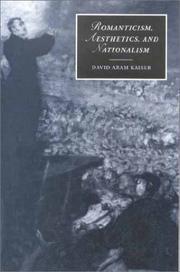
ISBN: 1107115337 0511005547 1280153490 0511117000 051114959X 0511309740 0511484313 0511050844 9780511005541 9780521630009 0521630002 0511035608 9780511035609 9780511117008 9780511484315 0521630002 0521022681 9780521022682 9781107115330 9781280153495 9780511309748 9780511050848 Year: 1999 Publisher: Cambridge : Cambridge University Press,
Abstract | Keywords | Export | Availability | Bookmark
 Loading...
Loading...Choose an application
- Reference Manager
- EndNote
- RefWorks (Direct export to RefWorks)
This ambitious study, first published in 1999, argues that our conception of the aesthetic sphere emerged during the era of British and German Romanticism from conflicts between competing models of the liberal state and the cultural nation. The aesthetic sphere is thus centrally connected to 'aesthetic statism', which is the theoretical project of reconciling conflicts in the political sphere by appealing to the unity of the symbol. David Kaiser traces the trajectory of aesthetic statism from Schiller and Coleridge, through Arnold, Mill and Ruskin, to Adorno and Habermas. He analyses how the concept of aesthetic autonomy shifts from being a supplement to the political sphere to an end in itself; this shift lies behind the problems that contemporary literary theory has faced in its attempts to connect the aesthetic and political spheres. Finally, he suggests that we rethink the aesthetic sphere in order to regain that connection.
Literature --- Aesthetics, Modern. --- Romanticism. --- Nationalism in literature. --- Politics and literature. --- Literature and politics --- Pseudo-romanticism --- Romanticism in literature --- Aesthetics --- Fiction --- Literary movements --- Modern aesthetics --- Appraisal of books --- Books --- Evaluation of literature --- Criticism --- Literary style --- History and criticism. --- Political aspects --- Appraisal --- Evaluation --- Aesthetics, Modern --- Nationalism in literature --- Politics and literature --- Romanticism --- 82.01 --- 82:32 --- History and criticism --- Esthetica --- Literatuur en politiek --- 82:32 Literatuur en politiek --- 82.01 Esthetica --- Thematology --- Arts and Humanities --- Aesthetics [Modern ]
| Listing 1 - 10 of 25 | << page >> |
Sort by
|

 Search
Search Feedback
Feedback About
About Help
Help News
News